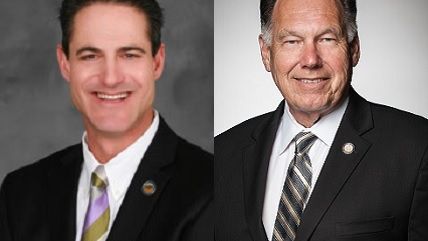Local California Political Duel Shows Limits of Ethics Reform
Political fight includes controversy over robocall in favor of ethics commission

If you want to watch a heated political feud, forget about the race between Hillary Clinton and Donald Trump. That presidential bad blood is toxic, but seems tame compared with what's going on in Orange County, Calif., between county Supervisor Todd Spitzer and District Attorney Tony Rackauckas. The two Republicans have been mixing it up for years, with Spitzer hoping one day to replace Rackauckas as the county's top cop.
This nasty local spat is of broader significance because it shows the pointlessness of creating commissions and new regulations to "fix" whatever's wrong with the political system. A couple weeks ago, I wrote for Reason about Orange County's Measure A, an effort by good-government activists to start an ethics panel to police campaign finance rules. "Often, these commissions are the worst of all worlds. They give the impression of oversight without actually overseeing much of anything," I concluded. It's not too independent either, given that politicians who will be monitored by the new panel get to choose its members.
Since then an intensifying spat between Spitzer and Rackauckas illustrates another crucial lesson: These commissions will almost certainly be gamed by political actors. Instead of clamping down on bad behavior, they offer tools for political actors to embarrass their opponents. The commission hadn't even been approved yet, and these two foes are using it to score points on each other.
Spitzer is a key supporter of the measure, which was overwhelmingly approved by voters on Tuesday. After he recorded a "robocall" backing it, Rackauckas called a press conference to accuse Spitzer of falsely impersonating an assistant district attorney. Rackauckas pointed to part of the script Spitzer read: "I have always played by the rules. As an assistant district attorney, I know that many politicians do not." Spitzer used to be an assistant district attorney until he was shown the door by Rackauckas in 2010.
Said Rackauckas at the presser: "Stunning isn't it? Not only does he falsely impersonate an assistant district attorney, he does not appear to follow campaign laws requiring 'paid telephone calls must identify the candidate who paid for or authorized the call.'" Spitzer, as quoted by the Register, responded: "The only person who could misinterpret what I'm saying in this robocall is a paranoid district attorney who has failed to do his job as the district attorney of Orange County." He said he clearly identified himself as a county supervisor at the beginning the call.
The D.A.'s office sent me Spitzer's latest campaign statement, in which he identifies himself as "a business owner, father and assistant district attorney," and a video in which he previously has identified himself as a former Los Angeles police officer—even though he was only a reserve officer. Rackauckas isn't going to press charges or do anything else about it. That's a good thing given these seem like fairly minor infractions.
At one level, this is great political theater. I've always been startled by Spitzer's tendency to play the first-responder card for maximum political impact. An amusing example: As a state assemblyman, he attended a press conference (regarding wildfires) dressed in yellow firefighter boots and a vest. In a less-amusing episode, last year he made a "citizen's arrest" of an unarmed man at a restaurant. After a youth counselor approached him to talk about the Bible, Spitzer went back to his car, grabbed a loaded gun and handcuffs and detained him until cops arrived.
Spitzer said he was concerned for his safety because the man was acting in a bizarre way. He told the Register his law enforcement background gives him "some kind of weird sixth sense when something's not right." My journalistic background gives me a similar sense about politicians. Neither the supervisor nor the D.A. is behaving in a manner that seems right—and I doubt yet another commission will do much about it.
After I contacted Spitzer, his office sent me a press release slamming the DA: "From the informant scandal committee to the grand jury, every independent and neutral observer who reviews the district attorney's management style is in complete agreement that the district attorney has allowed his office to become a rudderless ship with a culture of favoritism that endangers the public." Spitzer later issued another statement accusing Rackauckas of vindictiveness and retaliation.
This brings us back to Measure A, which was the measure that sparked all the fuss. Spitzer is for it. Rackauckas is neutral. But does anyone think creating a new panel will take the toxicity out of the political process? Or will it just give politicians another weapon with which to embarrass each other? We know the answer. Sorry, but there's no taking politics out of the political system, even if 70 percent of OC voters think otherwise.


Show Comments (19)